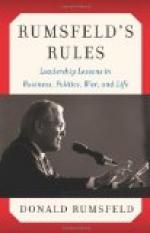Of the battle of Colenso Sir Redvers Buller’s telegraphic despatch, though it probably does the commander less justice than he would have received at the hands of any other narrator, gives an authoritative if meagre account. The attack seems to have been planned rather as a reconnaissance in force, to be followed up in case it should reveal possibilities of victory, than as a determined effort on which everything was to be staked. In all probability this form of action was inevitable in the conditions. The Boers held a strong position, covered in front by a river fordable at only two points. Such a position can hardly be reconnoitred except by attack. It could not be turned except by a long flank march, which, if successful would have occupied several days, during which the camp and railhead would have to be strongly guarded. There is reason to believe that the force in Natal has not the transport necessary to enable it to leave the railway for several days, during which it would be a flying column. Moreover, the Boers, being all mounted, could always place themselves across the path of any advance. Accordingly it is at least premature to assume that any course other than that which he adopted was open to Sir Redvers Buller. The mishap to a portion of the artillery will be better understood when the full story of the battle is accessible. Meanwhile Sir Redvers Buller’s withdrawal of the troops when he saw that success was unattainable has preserved his force, and he is now awaiting reinforcement before again attempting an advance. The critical element in the position of affairs in Natal lies in the fact that time runs against the British. Sir Redvers Buller and the Government no doubt know pretty accurately the date up to which Sir George White can hold Ladysmith. If by that date he has neither been relieved nor succeeded in fighting his way to the Tugela his situation will be desperate.
Lord Methuen has probably been as much hampered as Sir Redvers Buller by want of transport. He, too, will not forget the importance of preserving his force and his liberty of action, and will retire rather than await investment.
Through the mists which always shroud a war during its progress the fact is beginning to be visible that the British generals have been from the beginning paralysed not, as anxious observers are always prone to conclude, by any want of knowledge or energy, but by the nature of the implement in their hands. They have to fight an enemy of unprecedented mobility. The Boers are all horsemen and can ride from point to point more than twice as fast as the British infantry can march; they live in British territory by requisitions or loot, and therefore can limit their transport train. But the British forces are restricted to a little more than two miles an hour and to twelve or fifteen miles a day according to the ground. There is everywhere a deficiency if not a complete lack of transport, said to be due to the action of the Treasury during




